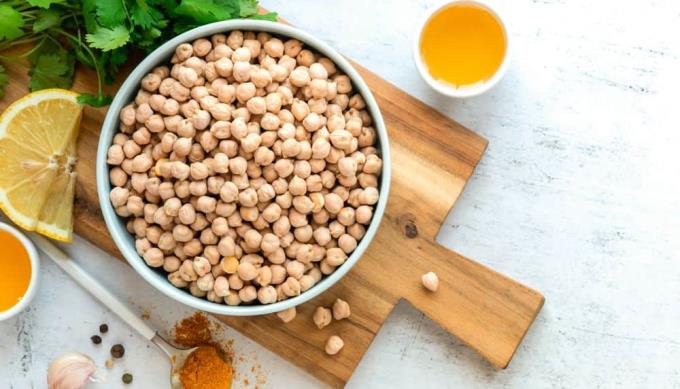Even so, that does not mean that chickpeas are classified as one of the foods pregnant women should avoid. Chickpeas bring many health benefits that outweigh the downsides, so this kind of nut should be present in any pregnant woman's menu. aFamilyToday Health will help you discover the advantages and disadvantages of chickpea for pregnancy health.
A few points about chickpeas
Also known as Garbanzo or Chana beans, chickpeas are among the oldest foods used today. This type of bean is also an indispensable food in the Middle Eastern diet for more than 7,500 years.
In terms of popularity, these beans are second only to soybeans . In our country, chickpeas are also popular not only for their delicious taste when used in combination in dishes, but also for their great source of nutrients.
In terms of use during pregnancy, chickpeas are considered a safe food. It is important to properly handle and process and consume in moderation.
Check out the benefits of chickpeas with pregnant women
Chickpeas can provide a variety of health benefits to both the fetus and pregnant mother in many ways. Some of them are listed below:
1. Preventing neural tube defects in the fetus
Studies show that chickpeas are rich in folate (folic acid). The presence of this substance in the body has been shown to help prevent neural tube defects in the fetus.
The Centers for Disease Control and Prevention (CDC) also recommends consuming a wide variety of folate-rich food sources to prevent fetal brainlessness and spina bifida . Besides, these complications often appear in the first few months of pregnancy, before the time when a woman finds out she is pregnant. So, be sure to regularly take in folate even if you're not planning to get pregnant!
2. Prevention of anemia in pregnant women
Pregnant women are the most common anemia, in which the amount of blood decreases, along with that, the hemoglobin values also decrease. Most of the cause of this problem comes from the lack of iron in the diet of pregnant women, which leads to poor production of hemoglobin - an important protein in red blood cells.
Do not underestimate this problem, because anemia makes mothers easily miscarried, pregnancy hypertension , postpartum haemorrhage. In addition, anemia in pregnant mothers also makes children more prone to the risk of premature birth, low weight, and more susceptible to disease. Fortunately, 100 grams of chickpeas contain nearly 22% of the iron content your body needs. Thanks to that, pregnant women who consume this bean regularly will not have to worry about iron deficiency during pregnancy.
3. Provide an abundant source of energy

Pregnancy is not something pleasant. Pregnant women often feel tired and exhausted during the nine months and ten days. Even if you do nothing but feel physically worn out, walking for a while will also be exhausted. Hence, you'll need more energy for yourself and the chickpeas are the perfect suggestion.
The whole serving of chickpeas is rich in protein, iron and even calories. According to statistics, for every 28 grams of chickpeas absorbed will provide you with 46 calories. About 67% of the calories come from carbohydrates, while the rest comes from protein and small amounts from fat.
4. Support brain development for your baby in the belly
In addition to the above nutrients, chickpeas are also rich in choline, a micronutrient that supports brain development, as well as contributes to building healthy nerves for the fetus. When you love chickpeas, it also means that you are indirectly nourishing the brain for the baby in your womb.
5. Good for the digestive system
Don't forget that chickpeas are also high in fiber, which is beneficial for the digestive system. The main fiber in these legumes is soluble fiber, which is extremely good at helping to increase the number of good bacteria in the gut and prevent the proliferation of harmful bacteria. Especially fiber is also helpful for repelling unpleasant constipation of pregnancy.
6. Improve overall health of fetus
Chickpeas also supplement with manganese to support the development of fetal bone and cartilage health. This nutrient plays an important role in cell protection and the body's metabolism of amino acids and carbohydrates.
A pregnant woman needs about 2 mg of manganese in a day, surprisingly you can get 1.69 mg of manganese if consuming about 164 grams of chickpeas.
7. Prevent diabetes
The fiber in chickpeas is not only beneficial for the digestive system but also aids in the prevention of diabetes . Studies have shown that when people with diabetes eat a lot of fiber, their blood sugar levels are always lower than those who don't. In addition to sugar control, fiber also helps regulate insulin and lipid levels in the body.
Some notes when eating chickpeas during pregnancy
Regardless of the type of food, when consumed during pregnancy, you need to be very careful. There are some effects of eating chickpeas that you should know the following:
Pregnant women are very concerned about their weight. Chickpeas can help control appetite, reduce overall calorie intake and prevent obesity .
If you've ever used and found yourself allergic to chickpeas then it's best to stay away from it.
Eating chickpeas may also cause an increase in gastric juice in some women. However, do not worry, soaking the beans overnight in water before processing can help you eliminate this situation.
Consuming chickpeas can also cause kidney stones or even gout because uric acid is absorbed by the body from the intake of beans. The purine in chickpeas is the leading cause of uric acid production that causes gout.
In the event that you have diarrhea, it is advisable to stop consuming the chickpea as it may make the situation worse.
Consuming high-fiber foods like chickpeas is a good idea for effective constipation relief. But eating the hard pea pods can cause many digestive problems that you want to avoid during pregnancy.
Consuming too much of anything can be harmful and chickpeas are not outside of this recommendation. The regular use of chickpeas in meals also leads to stomach upset and discomfort during pregnancy. Although the reason is still unclear, this condition is thought to be caused by accumulation of gas in the abdomen.
Some women with a soy allergy may also be allergic to chickpeas. If you are in this situation, avoid chickpeas as it can cause itching, nausea, or even an upset stomach.
Tell pregnant women how to prepare chickpeas

The following tips will help you cook dishes with chickpeas. Important to know include:
The first thing if you want to cook delicious dishes from beans properly, you need to soak them in water overnight.
Boiled chickpeas for about half an hour, then stir-fry with the same spices is a fun breakfast suggestion for the whole family.
If you are using canned chickpeas, just open the lid, reheat, and start enjoying your meal. Note that this canned bean product is not recommended for health.
When preparing boiled chickpeas, it is recommended that you add salt, pepper, tomatoes and coriander leaves. This makes the meal more appealing and at the same time stimulates your taste buds.
In addition to boiling, roasting chickpeas with a bit of olive oil and spices is another perfect alternative to consider.
You can use boiled chickpeas as a topping for the soup to make this dish less boring. The great taste it gives will arouse the taste buds, as well as satisfy your appetite.
Adding boiled chickpeas to a cup of yogurt is also a pleasant experience. In addition, you can also add cucumbers or raisins to make a dish more rich.
Above are the benefits as well as essential notes related to chickpeas that aFamilyToday Health wants to share with you. It's important to look at both sides to decide whether to include chickpeas or not. If you are still unsure, do not hesitate to consult with nutrition experts!













